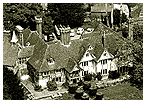Mr Lyward's Answer
by Michael Burn
The story of George Lyward and Finchden Manor
First published 1956 by Hamish Hamilton Ltd - All Rights
Reserved
Abridged for the World Wide Web
CHAPTER TWELVE
|
Chapter 1
Download |
HERE is a catalogue of labels attached to boys when they came to Finchden: - confused and feeling persecuted So far had these labels been forgotten that when I produced this list both Mr Lyward and his staff said, "Who on earth were they all?" Once at Finchden the boys did not seem like that. It may be thought encouraging that those to whom such descriptions were applied afterwards became: - Commissioned, then tea-planting Had a former boy at Finchden become an Archbishop, he might still have been a less striking success than those originally described as 'not very promising', and reported later as 'having found a job and stuck to it', or 'managing all right'. Alastair Wilton once dreamed of a horse that had only three legs 'yet seemed to get along all right'. Some boys are born 'with only three legs', and no one can give them a fourth; yet after leaving Finchden, such boys 'got along all right'. Many boys did not go into the kind of jobs their parents might have chosen - the members of Mr Lyward's staff possibly among them. Yet it cannot be questioned that the latter are 'doing well'. To some boys, Mr Lyward gave literally the will to live. One old boy
received terrible wounds in the war which needed nearly twenty operations.
But for his time at Finchden, he told a friend, he would never have
wanted to go on living. Another said it had enabled him to survive three
years as a prisoner of the Japanese. David Norris arrived at Finchden,
having been found in possession of a cosh. Above almost all else in importance, Finchden outflanked self- pity. All their previous lives the boys had been nagged, neglected or misunderstood, had not been given a fair start, and so on - with a reiterated litany of complaints. One boy who had witnessed many scenes of violence and brutality between his parents was described when he came as 'manic-depressive'. Years after leaving, he wrote: 'Thank you for helping me to obtain an optimistic view on life. If it wasn't for that and a sense of humour, I should be right down and yelling 'Nobody loves me!' How stupid that sounds now. And to think that at one time I actually believed it! It is a tremendous help to be able to talk about the worst happening in a humorous way, and at the same time hope for something better'. The story of Finchden Manor is overwhelmingly one of happy endings, or rather of happy beginnings: since the boys were given that chance to start again which life so seldom affords in later years. One thinks of all those others who never went to Finchden and are now in prison or needlessly unhappy. One thinks too of those parents who withdrew their sons against Mr Lyward's advice. A few remained unable to acknowledge, despite doctors' evidence, that their son was 'disturbed' and that they themselves were partly responsible. When the boy did not turn out as they wanted, they blamed Mr Lyward. The anxieties of all parents concerning the future of their children have increased. Too many forget that it is impossible to inject into their children the experience they themselves acquired from the inevitable mistakes of youth. Parents who exhort their children to lead the kind of life they themselves have led, risk revolt from those of strong character and despair from the weak. Many parents have not had the emotional tranquillity to reach an understanding of their child's needs, which would give far deeper help than the mere indulgence or refusal of his wants. Parents are also wise to avoid phrases like 'You've done it again!' which tend to make an action appear a habit. Is it surprising, then, that Finchden was often able to help parents - or that Mr and Mrs Lyward formed deep friendships with the families of boys who had been liberated there? Many boys brought their wives and girls to see Mr Lyward. In one or two instances, where the marriage had begun to go wrong, they came to him for advice. It was before the age of seven that things started to go wrong with the boys who went to Finchden. No-one denies that overcrowding and bad housing may have a bad effect on children, yet surprise has been expressed that so much adolescent crime should come from 'respectable' homes. The change of external environment at Finchden Manor made some boys more (and others less) comfortable than they had been at home and school. The real change, common to all, was in the atmosphere and spirit they found there. Boys in peril of growing up ever more narrow, stunted and one-sided were gradually able to go forward 'with head and heart reasonably at one.' This is a great achievement and contribution to the world. Never has it been easier for young people, whose feelings have been denied natural response, to find a camouflage. The extension of knowledge and communication daily furnish more equipment to the mind, from which people (deprived in other ways) can construct an effective but one-sided self. Our deepest inadequacies will not have been removed if, having landed on the moon, we remain as far as ever from ourselves and from one another. Mr Lyward was no enemy to technological education, nor to specialists. But he saw their dangers and, within the boundaries of Finchden, met them. He thus helped the boys to develop a full whole personality, within which any special skill acquired later would only be a part. One evening, I left Finchden to begin my book. As I drove away, mist was rising from the marshes, islanding Tenterden Church tower. The house looked tranquil and immune. The boys were going to bed. The windows blazed with light, and I heard Riff's gramophone. Narrow, built-up, the road to London resembled the beaten track which, for many, meant life. Out of sight, on the other side of the house, lay the marshes and wooded slopes which seemed as ever to be awaiting an explorer. I thought of all the young lives saved; of those other insecure adolescents, of whose sentence or arrest I should probably read, who were neither more nor less dangerous than many who had lived at Finchden. I thought of the staff there, renouncing opportunities they made possible for the boys. And I thought of Mr Lyward. In most places the day's work had ended long ago, and most people had returned to homes pleasantly distant from factory or office. But even at this late hour a boy would probably insist on seeing him. Interviews had filled the day, but reports still had to be made out, replies sent to troubled parents and county councils. Tomorrow would bring a visit from some new young educational officer, who had taken the place of an old friend. All would have to be explained afresh, without tiredness or impatience. I wondered if Mr Lyward would ever find time to give his story to the world himself, or if his work would be extended and passed on by other means. How great a healer is not only time but life! How patient and radiant a miracle! He had reminded me (and proved, in the world of speed and enmities) that this remains so. Stern, forbearing, courteous, light of touch; one of life's beloved teachers; one of the life-givers. THE END
|

MEMORIAL | BOOK | ESSAYS | BBC | AUTOBIOG | PHOTOS | ARTICLE | NOTES | FELLOWSHIP| OLD BOYS
http://www.finchden.com

